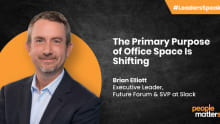
We must infuse the 'whole person' approach in our talent strategies: Greif’s Global CHRO
C-Suite#HybridWorkplace#LeadersSpeak
Bala V Sathyanarayanan serves as the Executive Vice President & Chief Human Resources Officer at Greif, Inc - a global player in industrial packaging products and services. Before Greif, he served as Executive Vice President for Business Transformation and Human Resources at Xerox Corporation. Bala also led the human resource function for the Americas Enterprise Business at Hewlett-Packard Inc. and has had leadership roles at Avaya Inc., Coca Cola Inc, and Otis Elevator Company. He focuses on delivering a world-class, diverse, and engaged workforce that can execute Greif's vision of being the best performing customer service firm in industrial packaging.
Bala currently serves as a Director on Balmer Lawrie – Van Leer Limited's board, a publicly-traded industrial manufacturer based out of India. He is also a Director on the board of the Columbus Council for World Affairs.
What are your top priorities as a global talent leader for this year?
With the pandemic shaping how we look at employee experience in the future, this is one of the top priorities as it impacts talent strategies. Another would be employee engagement as we continue to charter through the “Great Resignation”. Underlying these is our foundational priority, improving the DE&I efforts within every part of the world that we operate to create an equitable and inclusive environment.
What does successful HR transformation mean to you today amid this uncertainty?
HR transformation is all about transforming HR in a way to impact delivering business outcomes. If your business is not succeeding consistently, what has your HR transformation achieved?
What different types of hybrid models of work can we expect this year?
Hybrid modes of work will be necessary in the post-pandemic world. Many workplaces will never return to the more traditional models and the concept of work/life integration will need to be part of the value proposition going forward to continue competing in the war for talent. Setting up environments where workplace productivity is focused on outcomes and we accommodate individual preferences is a shift in mindset for many but required for future success.
MORE FOR YOU...
- Competition never stays still: Korn Ferry’s Audrey Tan
- Data is incredibly powerful: Ben Elliott, Experian APAC's CEO
How are people management evolving to the culture of new normal?
There is a continued shift away from seeing jobs and organisation structure in a rigid way; instead, we are starting to focus more on leveraging networks of teams and identifying and building skills that help us become more agile and adaptable in the future. In addition, learning to adopt a human-centered mindset in people management will only become more important.
Can you share the top lessons you have learned from this ongoing uncertainty, professionally?
This pandemic has inspired us to look at employee experience differently – how we infuse a 'whole person' approach that addresses the physical, emotional, and financial wellness into the talent strategies. It helped us think strategically about leveraging technologies to support collaboration and inclusivity. And how we can help people feel better about their work and more connected to the company’s mission to drive retention. Flexibility has certainly opened our eyes and reshaped how we look at workforce transformation as a whole.
Can you share one digital innovation/next-generation technology that you’re excited about and why?
It is the shift to cloud-based systems. Historically, HCM, timekeeping, ATT, Payroll etc. were on-premises solutions that did not speak to other HR systems effectively. Cloud-based systems are removing many of these challenges and help drive data integrity and automation opportunities. I’m very excited about the possibility of driving global employee development by leveraging tech in Metaverse!
What do you think are the two main reasons corporations are failing to reap the dividends of their diversity (DEI) initiatives?
First, many organisations continue to pursue DE&I initiatives purely through the lens of meeting diversity targets or representation objectives, without solving for a cultural shift. Second, lack of leadership advocacy and authenticity. If the message does not start at the top and be fully embraced by the senior-most leaders, including the Board of Directors and executive leadership team, it will fall flat.
If you were to speak about one thing about your company, what would it be?
We are a global company with a rich history of serving global communities for over 144 years! At the core of who we are and what we do is Servant Leadership. This leadership approach is embedded in each of the 44 countries that we operate in across the globe. Serving is in our DNA; it is the foundational guiding principle in how we lead and operate.
Top three skills that will have a major impact on talent landscape and organisational competencies?
In my opinion, it would be 'compassionate leadership' which is a combination of empathy and connecting with your people; 'digital skills' which empowers the workforce to build organisational capabilities and finally, 'agility'. With agility, we engage our workforce in being part of the solution, drive innovation and respond to the environment most effectively.
One message for the larger talent leaders globally to make the most of this uncertainty and come out stronger on the other side of the pandemic?
While HR has proven the very important role it has played in the past two years, we are faced with exciting new challenges and opportunities that are calling upon the continuous expansion of our influence in driving the future of work and business transformation. The time for talent leaders is now. Be the business leader who shapes business strategies that capitalise on the changing talent landscape!














